 Thanks to partners NetGalley and Wednesday Books for the digital ARC of Molly Morris's Annie LeBlanc Is Not Dead Yet. The book will be published tomorrow! I knew from the first page that I was going to love Molly Morris’s Annie LeBlanc Is Not Dead Yet. It’s quirky and original and just totally captivating. Here’s the premise: Wilson Moss is a high school senior, and she’s completely alone. She’s been alone since both of her best friends abandoned her, just as they were moving into their junior years. Ryan cut her off completely (though they—awkwardly—still work together at Ryan’s mom’s restaurant). Wilson’s mom left Wil’s long-time stepfather, the adult who provided the most stability in her and her younger half-sister’s life. Her friend Annie? She not only transferred to the local private school but also ended their friendship. And then, she died. Wil’s not exactly sure what happened, though she has some ideas. So, she takes a chance on her town’s unique contest, a once-every-decade anomaly. Any resident of Lennon can throw their name in the hat for a chance to bring back someone dead . . . for 30 days. Shockingly, Wil wins the contest, which means she has 30 days to (temporarily) resurrect her friendship and to figure out just what makes her so unlovable. The whole situation is complicated. Ryan had begun making small forays into friendship again, but Wil’s choice makes Ryan beyond angry since the first fissures in their friendship began with Annie and Ryan. And Wil isn’t content with 30 days, so when she picks up on a loophole from Ruth Fish (the seemingly immortal being who’s in charge of the town, and the contest) Wilson vows to mend the trio’s friendship and—hopefully—make this a real chance at life again for Annie, and a real chance at friendship again for her. This book has so many layers. I love the magical realism, the strangeness of the contest and the matter-of-fact way that everyone in the town accepts it. The world building is just fantastic. I love the complexity of Wilson’s character, the way she’s so valiantly trying to gain some control over the areas of her life that she lost, searching for love and friendship and family. The secondary characters here are incredibly vivid, too, and I could feel the ways that they’re struggling for so many of the same things that Wilson is hoping for, each existing as fully realized people in the same way that Wil is. After finishing Annie LeBlanc Is Not Dead Yet, I found out that Morris has one previous YA novel—I’ll be picking it up soon. Do yourself a favor, and put this one on your TBR.
0 Comments
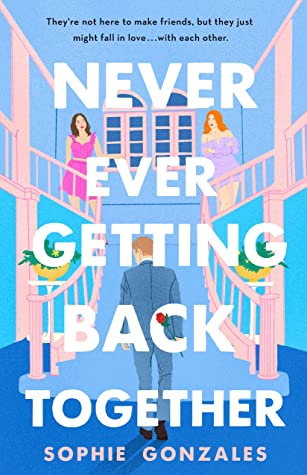 Thanks to partners NetGalley and Wednesday Books for the digital ARC of Sophie Gonzales's Never Ever Getting Back Together. The book is available for purchase! Sophie Gonzales’s Never Ever Getting Back Together features a fun premise: Maya and Skye are each vying—along with several other young women—to win back Jordy, their ex-boyfriend, on a reality show called Second-Chance Romance. It’s a Bachelor-type show that brings together a selection of Jordy’s exes with the supposition that the relationships that didn’t work before may work now. Because. Growth(?). It seems a bit convoluted on the surface, and it’s even more complex deep down. Jordy is the brother of a newly crowned princess, which means he’s been in the public eye: a public eye that has also fallen on Maya. After their breakup, Jordy painted her as a dangerously clingy, at least partially unhinged person, bypassing the fact that he’d been cheating on her for months with his new girlfriend, Skye. Maya accepts the invitation to appear on the show with the hope that she can reveal the truth about their breakup to the world that has blamed her for years. Skye accepts because she believes Jordy that he misses her *and* appreciates his warning that Maya is ready to unleash her unjust rage on both of them. So, when Maya and Skye arrive at the set of their show and realize that they’re rooming together . . . well, neither one is thrilled. The story alternates between Maya and Skye’s points of view, and each has been given plenty of reasons by Jordy to dislike the other. Yet that dislike goes only so far. I thoroughly enjoyed Never Ever Getting Back Together, which leans into the ridiculousness inherent in its reality show-foundation with its highly manufactured moments of drama (particularly since Jordy’s wealthy family made sure they had final editing rights). I didn’t completely buy the connection between Maya and Skye, and I thought that too many of these young women believed Jordy’s lies for just a bit too long. But overall, I liked the way Gonzales set up the evolution of each character’s arc and the way that the show, despite its artificiality, resulted in real self-reflection and growth. 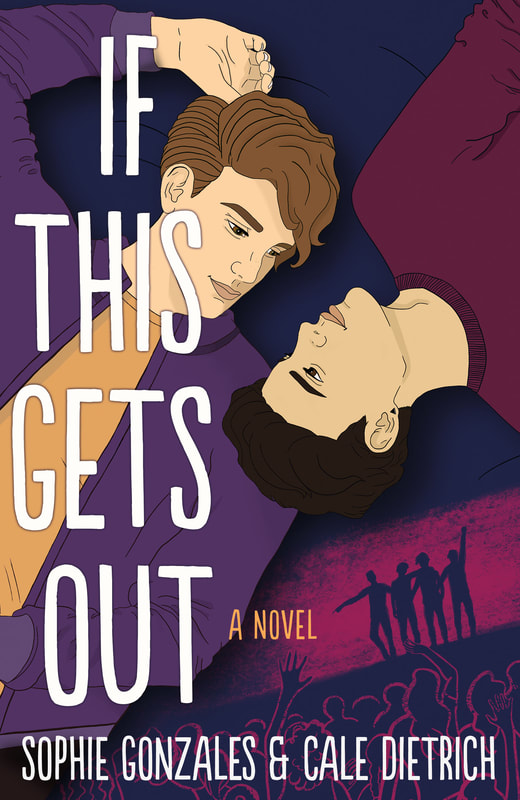 Thanks to partners NetGalley, Wednesday Books, and St. Martin's Press for the digital ARC of Sophie Gonzales and Cale Dietrich's If This Gets Out in exchange for an honest review. The book is out today!! I’m a big fan of author collaborations—I almost always really like them. (I’m not sure why, but maybe, just as in my life, collaborating pushes authors to be better?) Since I was already a fan of both Sophie Gonzales, author of Perfect on Paper, and Cale Dietrich, author of The Love Interest, requesting If This Gets Out seemed like a good choice. I was so, so right. At the center of If This Gets Out is a boy band, Saturday, made up of four kids who met at a summer camp, threw together a fun performance for the end-of-camp concert, and have never looked back. The four teenagers—Ruben, a classically trained singer who grew up on Broadway; Zach, a fan of punk and emo who is painfully shy; Angel, an outgoing, fun-loving partier; and Jon, a Type A, conservative heart throb whose dad manages the group—have remained close friends and have enjoyed their meteoric success, even as they strain against the roles in which they’ve been cast. Their carefully curated image presents all of them as straight (Ruben is not) and each of them somehow playing against type. Angel’s role, for example, is the sweet, conservative, shy boy, which he is *definitely* not. The story centers on Ruben and Zach and is told in their alternating points of view. Though all four are friends, Ruben and Zach are best friends, so Ruben has kept his attraction to Zach a secret. And then something happens that makes Ruben think Zach may return his feelings. Their relationship changes, at first bringing tension to the group and highlighting the tight control their management wields over their lives, and then causing each of them to understand new things about themselves. I loved so much about this book. First, it is propulsive: I had a hard time putting it down. The romance at its heart is lovely, and I appreciated the way Gonzales and Dietrich worked through its complications, both early on—when Zach is exploring his understanding of his sexuality—and later, when Ruben and Zach are contending with what they each need from the other. Dietrich and Gonzales create fully realized characters here who are dealing with fame but also with their relationships with their parents and friendships and all the drama that happens with teenagers. I also enjoyed the consideration of the boy band phenomenon. While I’m no student of the music industry, and boy bands aren’t really a part of my current listening, I was a HUGE fan of New Kids on the Block back in the day. So much of the novel here rang true, from the desperate need to have one type of boy for each fan to the denial that fans can handle the truths that all four band members want to share with their public. (I will say that the way the book employs social media certainly adds an angle that would not have been possible in the early NKOTB days!) If This Gets Out will work for so many readers, and I would definitely be in for further collaborations between Sophie Gonzales and Cale Dietrich (though I do plan to explore the rest of their individual backlists regardless!). This fabulous YA novel is emotional and thought provoking and sweet. I absolutely loved it. 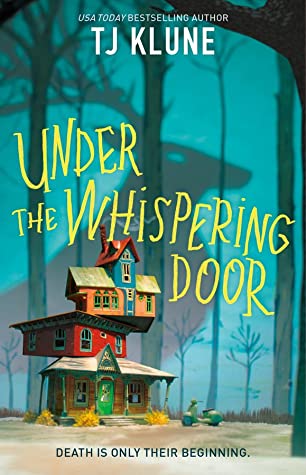 Thanks to partners NetGalley and Tor Books for the digital ARC of T. J. Klune’s Under the Whispering Door in exchange for an honest review. The book will be published on September 21! I cried my way through large portions of T. J. Klune’s Under the Whispering Door. While ultimately, I would call it a beautiful, hopeful book, it is also deeply, deeply sad. I mean, it is about death and the afterlife, so I guess that shouldn’t be a surprise, but I’m just putting that out there. Here’s the setup: Wallace is a horrible Scrooge of a fellow who is financially successful but just a miserable human being. He’s basically alienated everyone with whom he’s ever had a relationship, but he doesn’t even recognize that because he’s so focused on work and power and money. In fact, he takes an odd sort of pride in being needlessly cruel. Then, he dies suddenly of a heart attack. And all of those concerns that consumed his life and his time are gone. The world he enters is populated by an eccentric crew: reapers—in this case, a reaper named Mei; a ferryman named Hugo; and the ghosts of Hugo’s grandfather Nelson and dog Apollo. Wallace is stuck in Hugo’s tea shop until he can accept his death and figure things out and be ready to cross through a mysterious door on the fourth floor. The world building is more complex than I can or should cover, but there are fabulous conversations about Hugo and Mei’s responsibilities to the dead; about what matters in life; about who we choose to be when and if we have the chance to reconsider our choices. I feel as if I should address a big question here since I’ve been raving about The House in the Cerulean Sea since I read it (and that’s a big reason I requested this book!): Under the Whispering Door is NOT The House in the Cerulean Sea, nor does Klune try to make it that book. I always feel as if the expectation game is so fraught, so when I go in with high expectations, I’m almost always disappointed. Did Whispering Door bring me to the giddy heights that Cerulean Sea did? No. But that’s okay. I still found myself thinking and smiling and crying. This book is a success all on its own merits, and for me, it survived the peril of comparison with one of my favorite books of the year. 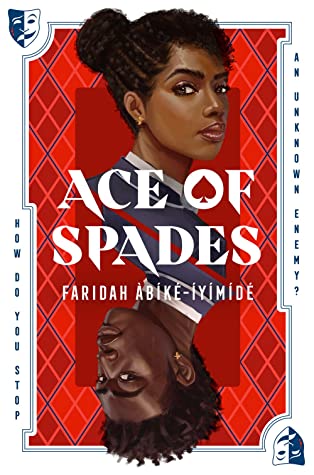 Thanks to Partners NetGalley and Macmillan for the digital ARC of Faridah Àbíké-Íyímídé’s Ace of Spades in exchange for an honest review. The book will be released on Tuesday, June 1. I wasn’t very far in Faridah Àbíké-Íyímídé’s Ace of Spades when I started to realize that something really strange was happening with the characters. Some of the pieces of this YA novel are familiar from other books about the power of privilege and the difficulty of navigating systems of power as an outsider, but other parts are wholly original. There’s a predominantly white private academy with a few key student honors for Senior Prefects. The narrative focuses on two students, the only Black students in their grade: Chiamaka Adebayo who has been forging a path to the top of her class, of the social scene, of every extracurricular, since she was a freshman; and Devon Richards who tries to stay as invisible as possible, banking on his talent as a musician to pave his way (and his family’s way) out of poverty. On the first day of their senior year, they attend the opening assembly with a new headmaster and find out the prefects. It’s no surprise that Chiamaka is named Head Prefect, but everyone is shocked when Devon receives one of the other Prefect spots. This is not part of the plan, and this initial contrast between Chiamaka’s confident acceptance of what she sees herself as being owed and Devon’s complete shock was immediately compelling. Chiamaka is surrounded by people, but they’re not really friends (at least mostly). Instead, she has a series of transactional relationships that help her to maintain her popularity—maybe her “popularity”—while doing the same for them. The one exception is Jamie, her absolute best friend . . . and the guy she’s had a crush on forever. Finally, she thinks it’s time for them to define their relationship differently. Devon, conversely, is a loner. He has one person, Jack, who has been his friend for a long time, but lately, that friendship seems to be based more in memory than in reality. Àbíké-Íyímídé develops these characters effectively as she shows how they are both so alone but in different ways. Clearly, Chiamaka and Devon are complete opposites. The only things they have in common are their race AND that they each have secrets that could ruin all of their plans. So when someone who goes by the moniker Ace of Spades starts sharing those secrets with the entire student body, Chiamaka and Devon are drawn to each other for support and to work together to solve the mystery. I thoroughly enjoyed this book, which earns its comps to Get Out. It took me a few chapters to be pulled in completely, but once the plot started unfurling, I couldn’t wait to pick up this book, which was just wild. Àbíké-Íyímídé writes the book in chapters that alternate between Chiamaka’s and Devon’s points of view, which amped up the suspense as I tried to piece together the real story behind the sabotage. The author addresses issues of race, sexuality, privilege, and class, all while developing two complex characters and a thrilling plot. 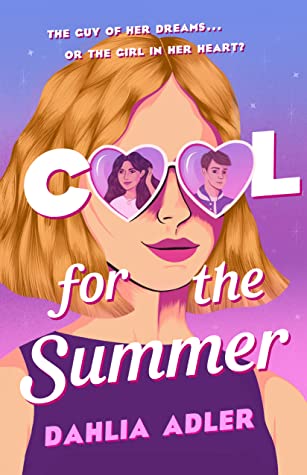 Thanks to Partner NetGalley and Wednesday Books for the digital ARC of Dahlia Adler’s Cool for the Summer in exchange for an honest review. The book will be published on Tuesday, May 11. Lara returns to high school after a summer break away in the Outer Banks to her dream-come-true: Chase Harding is noticing her. She’s had a crush on him forever, and though he’s always been friendly and kind (one of the qualities she most admires about Chase), he’s never really noticed her before. She’s thrilled. Really. She and her three best friends giggle and scheme, reveling in one of their own getting her wish. But then Jasmine walks into her school, and Lara is taken back to summer and to the friendship—and maybe more?—she had with Jasmine. It’s a great, compelling setup, but nevertheless, I was a little bit worried that I wouldn’t love this one. I wasn’t sure I could empathize with Lara or dig into the love triangle. But Adler masterfully shifts back and forth, unveiling both the story of Lara and Jasmine’s summer AND the journey through Lara’s year at school when she tries to navigate what happens when your dream isn’t so dreamy anymore. I thought these characters were compellingly flawed, and I genuinely liked the complexities of Lara’s friends, of Chase, and, of course, of Jasmine. Lara’s working through of her identity is all-too-believable, and I appreciated that Adler didn’t provide easy answers to who Lara should be. Dahlia Adler’s Cool for the Summer is a strong, thoughtful YA romance that breaks the mold of anything I’ve read lately. |
AuthorI'm Jen Moyers, co-host of the Unabridged Podcast and an English teacher. Archives
July 2021
Categories
All
|
Proudly powered by Weebly
 RSS Feed
RSS Feed